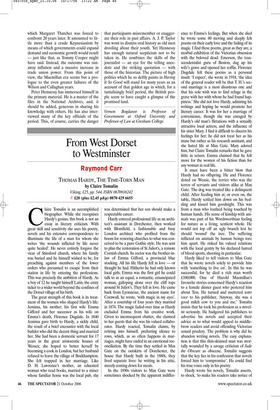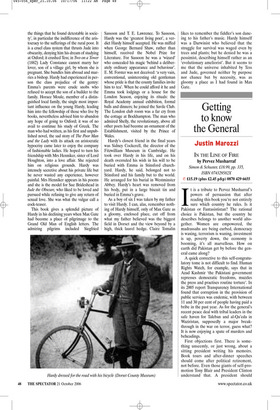From West Dorset to Westminster
Raymond Carr
THOMAS HARDY, THE TIME-TORN MAN by Claire Tomalin Viking, £25, pp. 544, ISBN 0670916242 ✆ £20 (plus £2.45 p&p) 0870 429 6655 Claire Tomalin is an accomplished biographer. While she recognises Hardy’s genius, this book is not an essay in literary criticism. With great skill and sensitivity she uses his poetry, novels and his extensive correspondence to illuminate the life of a man for whom she writes ‘the wounds inflicted by life never quite healed’. He never entirely forgave the vicar of Stinsford church, where his family was buried and he himself wished to be, for preaching against members of the lower orders who presumed to escape from their station in life by entering the professions. This was precisely the ambition of Hardy. As a boy of 12 he taught himself Latin, the entry ticket to a wider world beyond the confines of the Dorset village of his birth.
The great strength of this book is its treatment of the women who shaped Hardy’s life: Jemima, his mother; his first wife Emma Gifford and her successor as his wife on Emma’s death, Florence Dugdale. In 1840 Jemima gave birth to Hardy, a sickly child, the result of a brief encounter with the local builder who did the decent thing and married her. She had been a domestic servant for 17 years in the great aristocratic houses of Wessex; she hoped to better herself by becoming a cook in London, but her husband refused to leave the village of Bockhampton. She felt trapped in her marriage. Like D. H. Lawrence’s mother, an educated woman who read books, married to a miner whose familiar home was the local pub, she was determined that her son should make a respectable career.
Hardy entered professional life as an architect’s assistant in Dorchester, then worked with Blomfield, a fashionable and busy London architect who profited from the boom for restoring churches to what was conceived to be a pure Gothic style. He was sent to plan the restoration of St Juliot’s, a remote Cornish church. Its rector was the brother-inlaw of Emma Gifford, a provincial blue stocking. All his life Hardy fell in love — or thought he had. Hitherto he had only known local girls; Emma was the first girl he could talk to as an equal, a romantic, emancipated woman, galloping alone over the cliff tops around St Juliot’s. They fell in love. He came back from Lyonnesse, the ancient name for Cornwall, he wrote, ‘with magic in my eyes’. After a courtship of four years they married in 1874. The magic faded over time as Hardy excluded Emma from his creative work. Given to inconsequent chatter, she claimed to her guests that she was his valued collaborator. Hardy reacted, Tomalin claims, by retiring into himself, preferring silence to rows, which, as so often happens in marriages, might have ended in an emotional reconciliation. By the time they settled in Max Gate on the outskirts of Dorchester, the house that Hardy built in the 1880s, they lived separate lives: he writing in his attic, merely coming down for meals.
In the 1890s visitors to Max Gate were sometimes shocked by the apparent indiffer ence to Emma’s feelings. But when she died he wrote some 80 moving and deeply felt poems on their early love and the fading of its magic. I find these poems, great as they are, a morbid exhibition of the Victorian obsession with the beloved dead: Emerson, the transcendentalist guru of Boston, dug up his wife’s grave and opened her coffin. Florence Dugdale felt these poems as a personal insult: ‘I expect’, she wrote in 1918, ‘the idea of the general reader will be that T. H.’s second marriage is a most disastrous one and that his sole wish was to find refuge in the grave with her with whom he had found happiness.’ She did not love Hardy, admiring his writings and hoping he would promote her literary career. It was for her a marriage of convenience, though she was enraged by Hardy’s old man’s flirtations with a sexually attractive local actress, and the influence of his sister Mary. I find it difficult to discern his feelings for her; he did not treat her as his muse but rather as his research assistant, and she hated life at Max Gate. Mary adored him, but Claire Tomalin remarks that he gave little in return. Emma claimed that he felt more for the women of his fiction than for any woman in real life.
It must have been a bitter blow that Hardy had no offspring. He and Florence doted on Wessie, the terrier who was the terror of servants and visitors alike at Max Gate. The dog was treated like a delinquent child. After feeding him at, or even on, the table, Hardy settled him down on his bedding and kissed him goodnight. This was from a man who loathed being touched by human hands. His sense of kinship with animals was part of his Wordsworthian feeling for nature as a living, sentient whole. He would not lop off an ugly branch lest he should ‘wound’ the tree. The suffering inflicted on animals by human beings tore him apart. He risked his valued relations with the local gentry by his declared hatred of blood sports, shooting in particular.
Hardy liked to tell visitors to Max Gate that he wrote novels solely to provide him with ‘something to live on’. In this he was successful, for he died a rich man worth £100,000. One of Harold Macmillan’s favourite stories concerned Hardy’s reaction to a female dinner guest who pestered him about Tess. He turned and muttered sotto voce to his publisher, ‘Anyway, she was a good milch cow to you and me.’ Tomalin insists that he took his profession as a novelist seriously. He badgered his publishers to advertise his novels and accepted their advice as to what would appeal to middlebrow readers and avoid offending Victorian sexual prudery. The problem is why did he abandon writing novels. The easy explanation is that this thin-skinned man was mortally wounded by a savage criticism of Jude the Obscure as obscene. Tomalin suggests that the key lies in his confession that novels forced him to ‘compromise’. He could find his true voice only in his poetry.
Hardy wrote his novels, Tomalin asserts, to shock, ‘to make his readers take notice of the things that he found detestable in society’, in particular the indifference of the aristocracy to the sufferings of the rural poor. It is a cruel class system that thrusts Jude into obscurity, denying him his dream of studying at Oxford; it crushed Tess; in Two on a Tower (1882) Lady Constance cannot marry her lover, son of a village girl, by whom she is pregnant. She bundles him abroad and marries a bishop. Hardy had experienced in person the class prejudice of the gentry: Emma’s parents were crude snobs who refused to accept the son of a builder to the family. Horace Moule, member of a distinguished local family, the single most important influence on the young Hardy, leading him into the fellowship of those who live by books, nevertheless advised him to abandon any hope of going to Oxford; it was of no avail to continue his study of Greek. The man who had written, as his first and unpublished novel, the sad story of The Poor Man and the Lady with its attack on aristocratic hypocrisy came later to enjoy the company of fashionable ladies. He hoped to turn his friendship with Mrs Henniker, sister of Lord Houghton, into a love affair. She rejected him on religious grounds. Hardy was intensely secretive about his private life but he never wasted any experience, however painful. Mrs Henniker appears in his poems and she is the model for Sue Brideshead in Jude the Obscure, who liked to be loved and pursued while refusing to give any return of sexual love. She was what the vulgar call a cock-teaser.
This book gives a splendid picture of Hardy in his declining years when Max Gate had become a place of pilgrimage to the Grand Old Man of English letters. The admiring pilgrims included Siegfried Sassoon and T. E. Lawrence. To Sassoon, Hardy was the ‘greatest living poet’, a verdict Hardy himself accepted. He was miffed when George Bernard Shaw, rather than himself, received the Nobel Prize for Literature. For Sassoon he was a ‘wizard’ who concealed his magic ‘behind a deliberately ordinary appearance and behaviour’. E. M. Forster was not deceived: ‘a very vain, conventional, uninteresting old gentleman whose pride is that the county families invite him to tea’. When he could afford it he and Emma took lodgings or a house for the London Season, enjoying its rituals: the Royal Academy annual exhibition, formal balls and dinners; he joined the Savile Club. The London club room was a far cry from the cottage at Bockhampton. The man who admired Shelly, the revolutionary, above all other poets had become an ornament of the Establishment, visited by the Prince of Wales.
Hardy’s closest friend in the final years was Sidney Cockerell, the director of the Fitzwilliam Museum in Cambridge. He took over Hardy in his life, and on his death overruled his wish in his will to be buried with Emma in Stinsford churchyard. Hardy, he said, belonged not to Stinsford and his family but to the world. He arranged for his burial in Westminster Abbey. Hardy’s heart was removed from his body, put in a large biscuit tin and buried in Emma’s grave.
As a boy of six I was taken by my father to visit Hardy. I can, alas, remember nothing of Hardy himself, only of Max Gate as a gloomy, enclosed place, cut off from what my father believed was the biggest field in Dorset and the view beyond by a high, thick laurel hedge. Claire Tomalin likes to remember the fiddler’s son dancing to his father’s music. Hardy himself was a Darwinist who believed that the struggle for survival was waged even by trees and plants; but he denied he was a pessimist, describing himself rather as an ‘evolutionary ameliorist’. But it seems to me that the universe inhabited by Tess and Jude, governed neither by purpose nor chance but by necessity, was as gloomy a place as I had found in Max Gate.



































































































 Previous page
Previous page